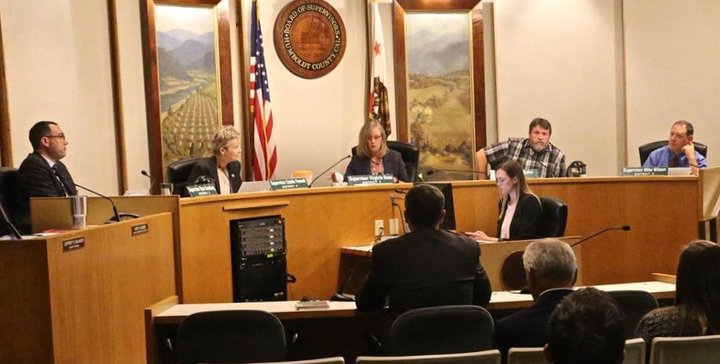
Humboldt County Supervisors (from left) Ryan Sundberg, Estelle Fennell, Virginia Bass, Rex Bohn and Mike Wilson. | Photo: Andrew Goff.
The Humboldt County Supervisors today decided to give weed growers a tax break — a select few of them, anyway.
In what was later characterized as a sort of administrative clean-up to the county’s still-young marijuana regulatory system, the supervisors unanimously agreed to prorate excise taxes on new outdoor grow operations.
The way the county ordinance was written up until today, a grower who obtained a permit in, say, November of this year for a 10,000-square-foot grow operation would be on the hook for the entire year’s excise tax — $10,000 — even though he or she likely wouldn’t harvest any crops until next fall.
After today’s approval, the same grower would only owe taxes on the days he or she actually held the permit. So if that permit were granted on Nov. 2 (the example given in the staff report), the grower would owe just over $1,500 in 2017 taxes.
In a separate — but also unanimous — vote, supervisors instituted a moratorium prohibiting cannabis activities in the coastal zone until after the California Coastal Commission approves the county’s Commercial Medical Marijuana Land Use Ordinance. (That’s expected to happen sometime next year.)
And in the same motion, the supervisors asserted that, even though the county ordinance says “medical marijuana,” it really applies to adult recreational use, too. If the county had failed to do this, staff warned, then the it would have been legally obligated to tell the state it had no regulations governing adult use, which would have left the state free to issue licenses to growers, thus bypassing local control.
County staff has been working hard to get the latest updates to the CMMLUO in place before Jan. 1, when the state starts issuing cultivation permits, but the burden of planning commission workshops and public comments, they may not get the thing done in time, according to the staff report. These wording changes implemented today will allow the county to maintain local control until the updated ordinance goes into effect and the Coastal Commission signs off on its provisions for the coastal zone.
Neither measure met any resistance from supervisors, though their conversation revealed some things about the state of the industry in Humboldt and the state.
After a break to address the folks rallying and chanting outside council chambers, supervisors returned to talk about the growers who are “jumping the gun,” starting up operations before their permits have been issued.
According to Humboldt County Planning and Building Director John H. Ford, county staff will have collected 1,800 completed applications before the month’s out, “which is a tremendous achievement,” he said.
And while Planning and Building staff expects to issue more than 400 permits before the year’s out, only about 60 have been issued thus far. And fewer than 30 growers have been fined for violating the ordinance.
“One of the things we’ve started to find is people who are existing growers are expanding” without permission, Ford told the board.
First District Supervisor Rex Bohn suggested that the county will get around to beefing up enforcement. “I hear people banging the drum,” he said. “This is gonna take some time, guys. [State] legislators are saying this is a 10 year process. We’re ahead of the game. Then again, we’re the industry leader; we should be ahead of the game.”
Bohn questioned whether fines now being collected should go toward the violators’ tax bills. Those caught growing without permits are currently being charged twice the amount they’d be taxed, and Bohn suggested half of that money could be applied to taxes. But his fellow supervisors weren’t having it.
“The fine is a fine and the tax is a tax,” said Second District Supervisor Estelle Fennell.
Third District Supervisor Mike Wilson agreed. “When I was voting on that [fine], the intention was it was a fine and not part of the tax.”
Ford said money collected through administrative fines goes into an account in the Planning and Building Department while taxes go into the county’s general fund. “So they’re completely separate,” he said.
During public comment, two cultivators got up to speak in favor of prorating taxes. One said the move would strengthen the county’s Retirement, Remediation, and Relocation (RRR) program, which encourages those growing on land not zoned for cultivation to move their operations elsewhere.
Another grower, J.J. Hanley, said he and his business partners have applied for that very program, and they’re looking forward to being completely above board.
“I’m not opposed to paying taxes,” Hanley said. “I can’t wait to pay taxes.”
CLICK TO MANAGE